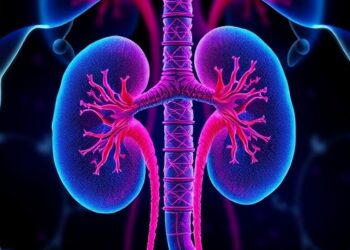New research led by UCLA Health has found that specific genes may be related to the trajectory of recovery for stroke survivors, providing doctors insights useful for developing targeted therapies.
New research led by UCLA Health has found that specific genes may be related to the trajectory of recovery for stroke survivors, providing doctors insights useful for developing targeted therapies.
Published in the journal Stroke this month, the findings were part of an exploratory study that sought to find if candidate genes could predict a higher likelihood of stroke outcomes related to depression, post-traumatic stress disorder and cognitive decline.
Dr. Steven C. Cramer, MD, the study’s lead author and a professor of neurology at UCLA, said while there are some predictors physicians can use to anticipate stroke recovery, such as a patient’s age or baseline health, they only tell part of the story.
“In the big picture, the issue that we face is that, when somebody has a stroke, it’s hard to anticipate what’s going to come next,” said Cramer. “People look up to us from the gurney in the ER and say, ‘What’s next? What’s going to happen to me?’ People want to understand what their trajectory will be, people want to have a sense of how well going to be, or not, and what treatments are available to them.”
Similarly, clinicians who treat patients with stroke need improved methods to understand how a patient will fare in order to develop a personalized medicine approach for each individual, Cramer said.
Past studies have provided evidence that genetic differences are related the process of stroke recovery, but there has been limited study on the specific outcomes with which these genes are associated. For example, most previous genetic studies related to stroke have relied on the modified Rankin scale, which is a measure of global disability that combines recovery data across all behaviors into one single-digit score.
However, Cramer said this scoring system does not account for the granular differences in stroke outcomes for patients, such as a patient having improved movement but continued severe depression, or having persistent anxiety but showing good recovering of arm movement. As a result, Dr. Cramer, in collaboration with Dr. E. Alison Holman at UC Irvine, sought to determine whether there was a method to more precisely measure the various behavioral outcomes among stroke survivors.
To do this, Cramer and his team measured details for a group of candidate genes to examine in more than 700 patients enrolled throughout the U.S. Additionally, researchers conducted detailed behavioral assessments of the participants’ cognitive health, depression, post-traumatic stress disorder symptoms, and other deficits for one year after the stroke.
The study found significant associations between certain genes and these behavioral health outcomes. Specifically, the rs6265 gene variant was associated with poorer cognition. This gene variant is related to brain-derived neurotrophic factor, or BDNF, which is the most common growth factor in the brain and is strongly associated with learning. About 20-30% of people are estimated to have this genetic variant, which slows the release of BDNF.
“Your brain gushes out BDNF when you’re learning new things,” Cramer said. “Hopefully your brain is gushing out BDNF at this very moment. People who have this gene variant had poorer cognitive status at one year.”
Environmental factors, such as stressors, also played a role in genetic expression among stroke patients. Patients with the gene variants rs4291 and rs324420 were at higher risk for developing more severe depression and PTSD symptoms after one-year post-stroke.
“The more stress they reported, the more the gene variant was associated with poorer outcomes,” Cramer said.
Another variant, rs4680 was linked to lower depression and PTSD symptoms.
While the results still require independent verification, Cramer said these insights could help physicians and other allied health professionals tailor treatment options for patients based on a simple genetic test.
“If these discoveries are validated as accurate, you could look at someone on the day they have their stroke and say, ‘I know that on average you are at higher risk of a poorer outcome regarding cognitive function a year from now,’” Cramer said. “Maybe those are the people that need extra cognitive rehab or maybe one day we’ll have a drug that targets certain gene receptors. The idea is that you could divide people into different groups and use that knowledge not just for prediction but hopefully one day for improved, individualized treatment.”
Article: Cramer SC, Parodi L, Moslemi Z, Braun RG, Aldridge CM, Shahbaba B, Rosand J, Holman EA, Investigators SS. Genetic Variation and Stroke Recovery: The STRONG Study. Stroke. 2024;55:2094-2102. doi: 10.1161/STROKEAHA.124.047643
Journal
Stroke
Method of Research
Experimental study
Subject of Research
People
Article Title
Genetic Variation and Stroke Recovery: The STRONG Study
Article Publication Date
9-Jul-2024




